It is more important than ever before to get vaccinated, not only to protect yourself, but to protect others. The College of Pharmacy is dedicated to making vaccinations easily accessible and readily available throughout the state.
“The role of pharmacists as immunization providers and advocates has grown significantly through the years,” said Dr. Ashley Hannings, Associate IPPE Director, who oversees the College’s vaccination efforts. “Pharmacists have really stepped up in response to COVID-19. So far, more than 162 million doses of COVID-19 vaccine have been administered by community pharmacies, and that doesn’t even include vaccine efforts from pharmacists working in other settings, such as health systems and outpatient clinics.”
Immunization is the safest, most effective way to prevent disease and death. Vaccines work with your body to develop immunity to disease. They recognize a foreign germ, virus, or bacteria and then initiate the production of antibodies in the immune system to fight the foreign body. Antibodies are naturally produced by the body to fight diseases; vaccines help target specific diseases (COVID-19, the flu, tetanus, etc.) and tell the body what antibodies to produce. While medicine targets a disease after it has already invaded the body, vaccines target the initial introduction to the disease to prevent it from spreading.
“Prior to the COVID-19 pandemic, vaccines prevented four to five million deaths a year. They are one of the most cost-effective means to prevent disease,” said Dr. Hannings. “Vaccines have decreased and/or mostly eradicated a number of diseases including polio, tetanus, influenza, hepatitis A & B, rubella, haemophilus influenzae, measles, whooping cough, streptococcus pneumonia, rotavirus, mumps, and chickenpox, among others.”
Most vaccines include an antigen, adjuvants, and preservatives. The antigen is a killed form of the disease that is used to train the body to produce the specific antibodies. Adjuvants boost our immune response to the disease, and preservatives ensure that the vaccine remains effective. The COVID-19 vaccine includes modified mRNA instead of an antigen to initiate the production of antibodies.
With the need for more immunizers to deliver both routine immunizations and COVID-19 vaccines, the College made a significant change to its immunization training program for PharmD students. This fall, the training program was transitioned from the second year to the first year of the curriculum. Before the end of August, all PharmD students enrolled at UGA were trained to give vaccinations.
This transition allowed the College to both maintain existing vaccine partnerships and expand the program in order to send students into more settings in the community. The College continues to partner with UGA’s University Health Center for the mobile influenza vaccine program, and collaborates with a number of community pharmacies in the area for vaccine delivery. In addition, vaccinations were provided by students on UGA’s extended campuses in Albany, Augusta, and Savannah, allowing the College to have an statewide impact. These pharmacy students have administered almost 3,000 influenza vaccines so far this season through these partnerships.
In addition to curricular efforts, a number of student organizations are involved in immunization efforts outside the classroom. This includes both vaccination clinics and immunization awareness and educational events.
For further information on vaccinations at the University Health Center, see here or contact your local pharmacist.
